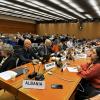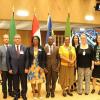News
Displaying Results 26 - 50 of 142
Cooperation and management of transboundary waters, which span over 45% of the world's surface and serve as vital resources for nearly half of the global population, face the imminent threat of underfunding. The last reporting exercise on Sustainable Development Goals (SDG) indicator 6.5.2 (2020),…
According to a recently published UNECE Policy Paper, the agrifood, the garment and footwear and the mineral sectors contribute significantly to the economic growth and employment in the UNECE region, while being major sources of global greenhouse gases (GHG) and environmental pollution. Evidence…
The Protocol on Pollutant Release and Transfer Registers (Protocol on PRTRs) sets international standards for reporting on pollutant releases from a range of economic activities, such as mineral industry operations, plastic production, waste and wastewater management or the rearing of poultry or…
Transparency in the environmental performance of economic activities and effective public access to environmental information, especially on products, are indispensable in addressing pressing environmental challenges. This also supports a just transition towards a green and circular economy,…
The Mediterranean Region, home to over 510 million people, is an important crossroads for economic, social and cultural exchanges between Europe, Africa, Asia and other continents. The region is rich in biodiversity, but has come under pressure due to the intensive exploitation of mineral resources…
In the UNECE region, the Fourth Cycle of Environmental Performance Reviews (EPR) kicks off with the review of Tajikistan, carried out for the fourth time under the leadership of UNECE.
A large, multidisciplinary team of international experts worked in Dushanbe from 6 to 15 November 2023,…
The European Commission has proposed a new legislation, the European Critical Raw Materials Act, to ensure a secure and sustainable supply of critical raw materials for the EU. The Act, on which the European Parliament and the European Council reached a provisional agreement on 13 November,…
Strong private sector engagement positively impacts the relevance, legitimacy, and credibility of national trade facilitation bodies (NTFBs) and encourages a business-centric approach to trade facilitation. Over the past several years, governments, donors and international organizations have…
In the pan-European region, citizens are feeling the impacts of climate change through extreme weather events. This undermines equitable access to water and sanitation as human rights, due to increasing water scarcity and increased burden of water diseases due to overflow of untreated sewerage…
Transboundary rivers, lakes, and aquifers play a vital role in supporting the livelihoods of billions of people worldwide. Roughly 60% of global freshwater flow is in shared basins. About 40% of the world’s population lives in shared basins. The development and management of transboundary water…
Central Asia has significant untapped potential to decarbonize its energy systems and accelerate the sustainable energy transition, including through renewable energy development and enhanced resource management. To help the region capitalize on these opportunities, UNECE, the United Nations…
Almost all of Botswana’s territory sits within transboundary rivers basins. Although landlocked, Botswana is therefore a ‘water-linked’ country. The Cubango-Okavango, Limpopo, Orange-Senqu and Zambezi Rivers all provide crucial freshwater arteries that supply people and nature, including the…
UNECE support for the revision of the Georgian Mining Code Act is shaping the future of resource classification and estimation standards in Georgia. During a workshop in Tbilisi participants discussed how Georgian standards could play a crucial role in harmonizing with the global dimensions of the…
An estimated 3.6 billion people face inadequate access to water at least a month per year – a figure expected to increase to more than 5 billion by 2050. According to WMO, over 50% of global catchment areas and reservoirs displayed deviations from normal conditions in 2022, of which the majority…
The ongoing repercussions of the COVID-19 pandemic, geopolitical instability, and elevated inflation rates continue to pose challenges to global trade, with the World Trade Organization (WTO)'s trade growth forecast now estimated at only 0.8% this year.
As the global trade landscape grapples…
In the Drina River Basin, shared mainly by Bosnia and Herzegovina, Montenegro and Serbia, working together across borders and jointly addressing water and energy challenges is a key part of effective climate action and the green transition.
As part of the Sarajevo Energy and Climate Week (25-29…
Taking up some of the main results of the recent review report, which assessed the effectiveness of the amended Protocol to Abate Acidification, Eutrophication and Ground-Level Ozone (Gothenburg Protocol) under the UNECE Convention on Long-range Transboundary Air Pollution, experts discussed…
The building industry currently accounts for 39% of global energy-related CO2 emissions, 11% of which result from manufacturing building materials and products such as steel, cement, and glass. And yet, to date, emission reduction efforts have not really focused on decarbonizing the construction…
The public and civil society have a crucial role to play in tackling key environmental challenges. To make the most of this potential, continued efforts are needed to uphold their rights to shape environmental decision-making.
To this end, the Working Group of the Parties to the Convention on…
Bringing together countries to share progress and experience on how to effectively manage their shared waters is a key characteristic of the Water Convention. Cooperation for the management of transboundary waters to promote sustainability, peace and security is the Convention’s mantra - especially…
As one of the United Nations regional economic commissions, UNECE has a key role to play in helping countries with economies in transition to better integrate into the global economy. UNECE is at the forefront of setting international standards on cross-border procedures, identifying regulatory and…
Central Asian countries are actively working towards improving access to water and sanitation. Despite recent progress, Kazakhstan's aging infrastructure, lack of human resources and financial constraints still limit the access of rural population to improved water and sanitation services. In 2022…
For some time now, Uzbekistan has been engaged in various activities under the UNECE Convention on Access to Information, Public Participation in Decision-making and Access to Justice in Environmental Matters (Aarhus Convention).
An international round table entitled “Aarhus Convention: Effective…
As the global economy emerges from the COVID-19 pandemic and governments strengthen efforts to “build-back-better”, trade as an engine of growth has re-emerged in policy agendas. For developing countries and countries with economies in transition that are still in the process of accession to the…
Over two-thirds of Togo’s water resources are shared, notably through the Mono River basin (shared with Benin) and Volta River basin (shared with Benin, Burkina Faso, Côte d’Ivoire, Ghana and Mali), as well as aquifers in the coastal sedimentary basin (shared with Ghana, Benin and Nigeria).
In a…
























